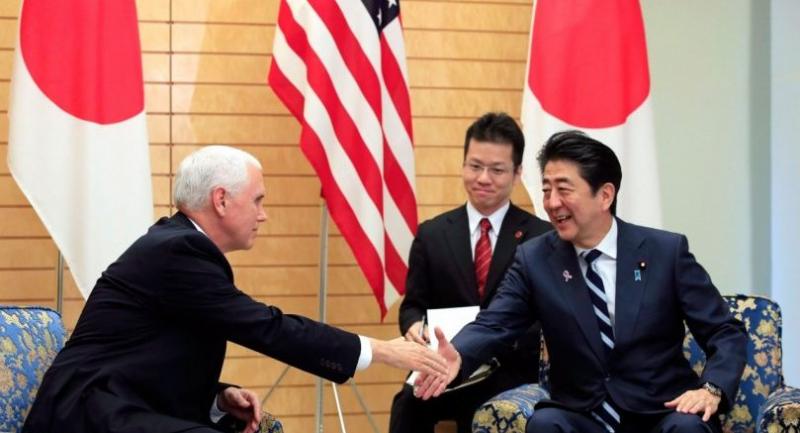Japan, U.S. to invest ¥8 tril. in Indo-Pacific development

Prime Minister Shinzo Abe and U.S. Vice President Mike Pence agreed Tuesday that Japan and the United States will work together to provide up to $70 billion (about ¥7.98 trillion) for infrastructure development primarily in the Indo-Pacific region.
Abe held talks with the visiting U.S. vice president at the Prime Minister’s Office on Tuesday morning, where they also agreed to deepen cooperation on North Korea’s complete denuclearization.
This was the first time Abe has held direct talks with a high-ranking official of the administration of U.S. President Donald Trump since the U.S. midterm elections on Nov. 6. At their press gathering after the talks, they delivered a joint statement, which included the infrastructure development initiative.
At the media gathering, Abe welcomed Pence, who was visiting Japan ahead of the Asia Pacific Economic Cooperation (APEC) summit and other meetings in Papua New Guinea. Abe stressed, “As we were able to closely coordinate our policies, this indicates strong ties in the Japan-U.S. alliance.”
In response, Pence described the Japan-U.S. alliance as the “cornerstone” of peace and prosperity in the Indo-Pacific.
The Japan-U.S. initiative in infrastructure development centers around energy. At the press gathering, Pence officially announced the United States will provide $60 billion (about ¥6.84 trillion) for the initiative. Together with $10 billion (about ¥1.14 trillion) in assistance from the Japanese government, as stipulated in the joint statement, the investment by the two countries totals $70 billion.
Specifically, Tokyo and Washington intend to work on cultivating local human resources who can engage in the construction of liquefied natural gas facilities in places such as Southeast Asia and work there in a bid to expand exports of LNG produced in the United States for Asia.
Japan and the United States showcased their stance of jointly promoting a “free and open Indo-Pacific region,” which Abe has touted, amid China’s moves to expand its influence in Southeast Asia and other regions through its Belt and Road initiative, which is aimed at creating a huge economic zone.
Japan and the United States are scheduled to launch negotiations on a trade agreement on goods (TAG) early next year. Abe and Pence agreed to expand bilateral trade and investments that will benefit both countries, and also seek economic development in the Indo-Pacific based on “fair rules.”
Regarding North Korea, Abe and Pence also agreed that the full implementation of sanctions against the country based on U.N. Security Council resolutions is crucial for Pyongyang’s denuclearization.
In addition, they confirmed that the two countries will deal with “ship-to-ship” transfers in which North Korea transfers cargo, including refined petroleum products, between vessels on the high seas, and that they will work together to resolve the abduction issue involving Japanese nationals at an early date.
During their talks, Abe explained to Pence about his visit to China in October. The two then agreed that Tokyo and Washington will engage in constructive dialogue with Beijing and continue to coordinate closely.
Ahead of their talks, Pence met with Vice Prime Minister Taro Aso at the Prime Minister’s Office.
